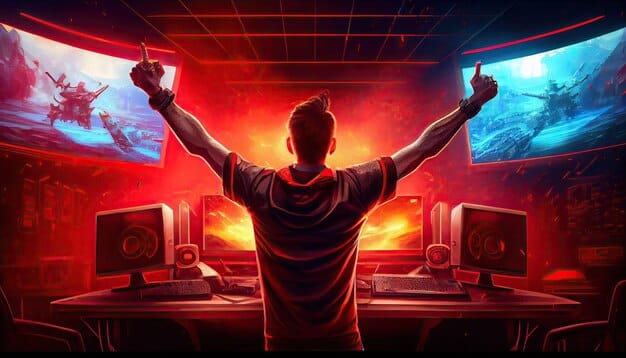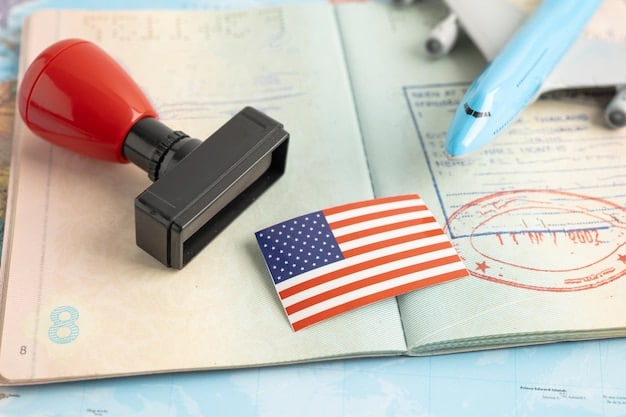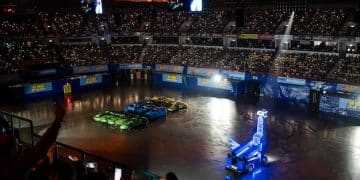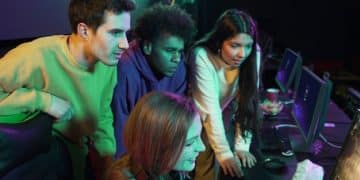Esports Player Visa Regulations in the US: What’s New for 2025?

The latest updates on 2025 esports player visa regulations in the US focus on streamlining the P-1 visa process, addressing backlogs, and potentially introducing new visa categories to accommodate the growing esports industry.
The world of esports is rapidly expanding, with the US being a major hub for tournaments and professional players. Understanding the **latest on the 2025 esports player visa regulations in the US** is crucial for teams and players alike to ensure seamless participation in competitions. Let’s dissect the current landscape and what potential changes lie ahead.
Current Visa Options for Esports Players in the US
Navigating the US immigration system can be challenging, but several visa options are currently available to esports players. These options cater to different circumstances, from short-term tournament participation to longer-term professional engagements.
P-1 Visa: Internationally Recognized Athletes
The P-1 visa is one of the most common pathways for esports players to enter the US. It’s designed for individuals who are internationally recognized athletes. This visa requires proving the player’s skill level and recognition in the esports community.
B-1/B-2 Visa: Short-Term Business or Tourism
For esports players participating in short-term tournaments or events, the B-1/B-2 visa might be suitable. This visa is typically used for business or tourism purposes. However, it’s essential to ensure that the activities are consistent with the visa’s terms to avoid any issues.
- P-1 Visa requirements: Proving international recognition, securing a US-based sponsor, and demonstrating eligibility criteria.
- B-1/B-2 Visa limitations: Not suitable for long-term engagements or employment within the US.
- O-1 Visa considerations: Reserved for individuals with extraordinary ability; requires substantial documentation.
Different visa categories offer different advantages and disadvantages. Understanding these nuances is crucial for players and teams to choose the best option. Engaging with immigration legal professionals can help avoid potential pitfalls and ensure compliance.
Potential Changes to Esports Visa Regulations in 2025
Looking ahead to 2025, the esports industry may see some updates in visa regulations to accommodate its unique needs. Several factors are driving this potential change, including the increasing recognition of esports as a legitimate sport and economic activity.

Legislative Efforts to Recognize Esports
Lawmakers see the need to adapt regulations to better fit the esports landscape. These efforts could lead to new visa categories tailored specifically for esports professionals.
Industry Advocacy for Streamlined Processes
Esports organizations and stakeholders advocate for more streamlined visa processes to attract top talent from around the world. Their lobbying efforts can influence policy changes and regulatory amendments.
The potential changes aim to simplify the visa application process, reduce processing times, and provide more clarity for esports professionals entering the US. Industry experts predict that favorable reforms will boost the esports market in the US, making it more competitive globally.
Challenges with the Current Visa System
Despite the existing visa options, esports players and teams often face several challenges when navigating the US immigration system. These challenges can include lengthy processing times, high denial rates, and a lack of understanding among immigration officials about the nature of esports.
Processing Delays and Backlogs
Visa processing delays can significantly impact esports events and competitions, preventing players from participating in scheduled tournaments or matches. Backlogs in the immigration system can exacerbate these issues.
Inconsistent Interpretation of Visa Requirements
The interpretation of visa requirements can vary among different immigration officials, resulting in inconsistent decisions and uncertainty for esports players. This lack of clarity can lead to confusion and frustration.
Efforts to streamline the visa process and provide more guidance for immigration officials can help mitigate these challenges. Industry associations and legal experts play a vital role in advocating for clearer, more consistent enforcement of visa regulations.
How to Prepare for Visa Applications in 2025
Given the complexities of the US visa system, it’s crucial for esports players and teams to prepare thoroughly for visa applications. Proactive planning and attention to detail can increase the chances of a successful outcome.
Gathering Necessary Documentation
Collecting all required documents is essential for a complete and accurate visa application. This documentation may include proof of international recognition, letters of support from esports organizations, and contracts with US-based teams.
Seeking Legal Assistance
Engaging with immigration legal professionals can provide valuable guidance and support throughout the visa application process. Experienced attorneys can help navigate complex regulations and address potential issues.
Preparing thoroughly for visa applications also involves staying informed about the latest updates and changes in immigration policies. Consulting with visa experts and attending industry seminars can provide valuable insights.
By taking a proactive approach and seeking expert advice, esports players and teams can mitigate risks and ensure compliance with US visa requirements. This preparation is especially important given the fluid nature of immigration policies and the potential for regulatory changes in the future.
The Role of Esports Organizations and Sponsors
Esports organizations and sponsors play a crucial role in supporting players through the visa application process. Their involvement can significantly improve the chances of a successful outcome.

Providing Letters of Support
Esports organizations can provide letters of support to visa applicants, attesting to their skills, achievements, and contributions to the esports community. These letters can carry significant weight with immigration officials.
Sponsorship and Financial Assistance
Sponsors can offer financial assistance to cover visa application fees and legal expenses, making the process more accessible for players. Their sponsorship can also demonstrate the player’s professional standing and potential economic impact.
- Advocating for visa reform: Lobbying efforts to influence policy changes.
- Educating players: Providing resources and guidance.
- Facilitating connections: Linking players with legal professionals.
Organizations and sponsors help by ensuring that players have the resources and support they need to navigate the complicated visa application process. Their combined efforts can contribute to the growth and success of the esports sector in the US.
Future Outlook for Esports Visas in the US
The future of esports visas in the US is likely to be shaped by ongoing advocacy efforts, legislative reforms, and the increasing recognition of esports as a legitimate industry. Several trends could impact the visa landscape in the years to come.
Potential for a Dedicated Esports Visa Category
The creation of a dedicated esports visa category might streamline the immigration process and provide more clarity and certainty for players. This category could recognize the unique characteristics and demands of the esports industry.
Increased Collaboration Between Industry and Government
Greater collaboration between esports organizations and government agencies can lead to more informed and effective visa policies. This partnership can help address the specific needs and challenges of the esports community.
The forecast suggests that changes will bring more opportunities for international esports talent to compete and collaborate in the US. Proactive measures to improve visa accessibility and efficiency will bolster the country’s position as a global esports leader.
The esports sector stands to gain significantly from innovative new improvements to legislation that support talented individuals. Such improvements will not only enhance the quality of competitions but also drive financial growth and job creation within the US esports ecosystem.
| Key Point | Brief Description |
|---|---|
| 🔑 Visa Options | P-1, B-1/B-2, and O-1 visas are common options for esports players. |
| 📅 Potential Changes | Legislative efforts and industry advocacy may streamline visa processes in 2025. |
| ⚠️ Challenges | Processing delays and inconsistent interpretation of visa requirements are common issues. |
| 🤝 Organizations’ Role | Esports organizations provide support letters and financial assistance. |
FAQ
The P-1 visa is designed for internationally recognized athletes, including esports players, to compete in events or tournaments in the US. It requires proof of international recognition and a US-based sponsor.
The B-1/B-2 visa is suitable for short-term business or tourism purposes, including participation in esports tournaments. However, it’s not appropriate for long-term engagements or employment in the US.
Common challenges include processing delays, inconsistent interpretations of visa requirements by immigration officials, and a lack of specialized visa categories tailored for esports.
Esports organizations can provide letters of support, financial assistance, and resources to help players navigate the visa application process. They can also advocate for visa reform and educate players.
The future may include a dedicated esports visa category, increased collaboration between industry and government, and streamlined processes to attract international talent and boost the US esports market.
Conclusion
Staying informed about the **latest on the 2025 esports player visa regulations in the US** is crucial for players, teams, and organizations. By understanding the current options, anticipating potential changes, and preparing thoroughly, esports professionals can navigate the US immigration system successfully and continue to thrive in the competitive esports landscape.





